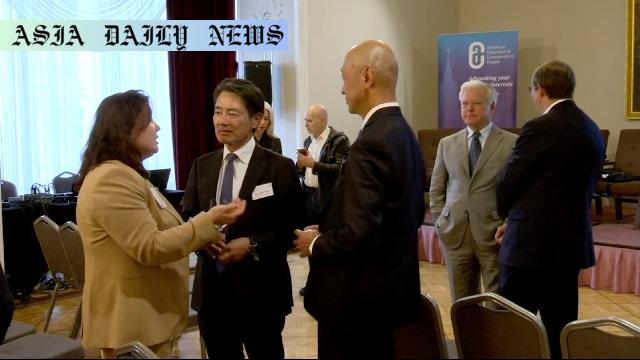Russia remains a vital market for US and Japanese firms, but risks persist.
Japanese and US firms explore post-conflict opportunities in Russia.
63% of Japanese companies view Russia as an important market.
78% of Japanese companies cite reputational risks in Russia.

Overview of Opportunities in a Post-Conflict Russia
As tensions surrounding the Ukraine conflict persist, companies from the United States and Japan are already looking beyond the crisis to prepare for possible strategic openings in Russia. In a recent event hosted by the Japanese Business Club and the American Chamber of Commerce in Russia, business leaders and government officials engaged in discussions on the long-term prospects for foreign investment and bilateral trade in the Russian market. While the discussions were marked by cautious optimism, they did not shy away from addressing the considerable reputational and operational risks involved.
According to Owatari Kozo, a representative of the Japanese Business Club, businesses should start planning now for the eventual changes in Russia’s economic and political landscape. He emphasized the need for cooperation between public and private sectors to ensure a smoother transition into new market opportunities. The aim is to position companies for success in a post-conflict Russia while proactively mitigating long-term risks.
US Businesses Encouraged by New Diplomatic Dialogues
Robert Agee, from the American Chamber of Commerce, shared insights into the renewed dialogue between the United States and Russia. He contrasted the current climate of engagement under President Donald Trump with previous years, during which bilateral relations were more adversarial. A sense of guarded optimism pervades the discussions as U.S. businesses consider how improved diplomacy might lead to favorable economic partnerships in the future. Agee’s remarks underscore the importance of stable international relations for fostering trade and investment opportunities between nations.
Despite the enthusiasm, a significant challenge looms large—many businesses are aware of the reputational risks associated with operating in Russia. According to a survey by the Japanese Business Club, 63% of its 130 member companies regard Russia as an important market. Nevertheless, 78% believe that conducting business in Russia might harm their company’s global reputation. The survey highlights the delicate balance companies must strike as they weigh the economic benefits against the potential fallout from navigating politically sensitive markets.
Risks and Rewards in the Russian Market
Russia represents a unique dichotomy for investors. On one hand, its vast market offers unmatched growth potential in industries ranging from energy to technology and consumer goods. On the other hand, entering or expanding within the Russian market comes with considerable risks, particularly in geopolitical contexts. Sanctions, regulatory hurdles, and public perceptions are among the many factors businesses must navigate.
Through strategic foresight, both U.S. and Japanese businesses aim to stay ahead of the curve, preparing themselves for a Russian market that may open up in new ways post-conflict. While current operational challenges are undeniable, opportunities in sectors like infrastructure development, sustainable energy, and digital innovation may ultimately outweigh concerns about reputational damage or political instability.
The Role of Joint Efforts and Collaborative Strategy
A consistent theme arising from the discussions hosted in Moscow was the need for joint efforts between governments and corporations. Collaborative planning ensures that businesses have not only the financial but also the diplomatic backing for navigating tumultuous markets. By forging multi-level partnerships and building goodwill, international corporations are positioning themselves as potential economic bridges between nations.
Looking forward, the integration of both public and private strategies can help foster transparent and balanced trade partnerships. In aligning business goals with both host and home country interests, U.S. and Japanese corporations aim to spearhead the future economic revival of Russia, perhaps even facilitating a normalization of diplomatic ties worldwide.



Commentary
Reflections on the Strategic Opportunities in Russia
The renewed interest by Japanese and U.S. companies to evaluate Russia as a future market highlights the unwavering pull of its economic potential despite ongoing challenges. This initiative underscores how businesses are often at the forefront of fostering relationships, even when political circumstances remain strained or uncertain. By engaging in discussions now, foreign corporations are demonstrating not only preparedness but also resilience in the face of adversity.
Balancing Risk with Reward
It is notable how 78% of businesses flagged reputational risks as a major factor in their decision-making regarding Russia. This statistic reflects the evolving role of corporate social responsibility in today’s interconnected and highly scrutinized business environment. Companies are increasingly aware of their brand value beyond mere financial returns and are making calculated choices to balance profits with ethical considerations. Countries like Russia—with its blend of opportunities and challenges—illustrate the fine line corporations must navigate as they seek growth in emerging or politically sensitive markets.
The Role of Dialogue in Navigating Uncertainty
Robert Agee’s comments on positive strides in U.S.-Russia diplomacy provide an interesting backdrop to the economic discussions. Dialogues between nations are critical for enabling a safer, more predictable landscape for business. By fostering trust and reducing uncertainties, governments can greatly affect how corporations decide to pour investments into a country. Forward-looking strategies, such as the one Agee suggested, could pave the way for long-term growth and mutually beneficial outcomes.
In conclusion, the ongoing conversations among U.S. and Japanese businesses about opportunities in a post-conflict Russia reflect a blend of cautious optimism and strategic foresight. As these companies wait for conflict resolution, it will be fascinating to see how their efforts impact Russia’s future economic landscape and, potentially, the global economy as well.